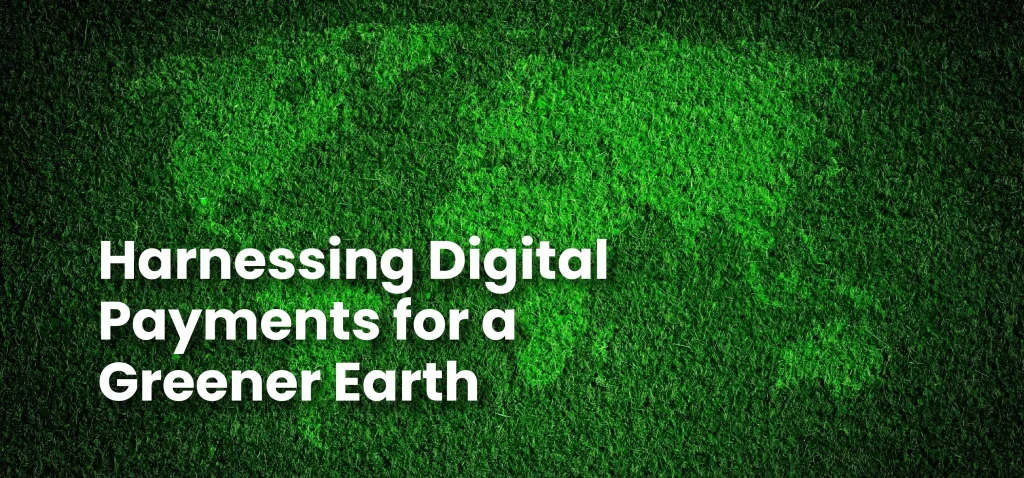As we celebrate Earth Day this year, it’s crucial to reflect on innovative solutions that contribute to environmental sustainability. One such solution gaining traction worldwide is the revolution in digital and mobile payments, particularly Unified Payments Interface (UPI) and Quick Response (QR) code payments. This technological advancement not only streamlines financial transactions but also plays a significant role in saving forests, reducing paper usage, and mitigating environmental degradation.
Embracing Mobile Payments
Mobile payment solutions are rapidly gaining popularity worldwide, with an estimated 2.1 billion people expected to use mobile wallets by 2025, according to Statista. By encouraging the use of mobile payments, fintech companies are reducing reliance on physical cards and cash, leading to fewer resources being used in the production and distribution of these materials.
The Rise of UPI and QR Payments
The emergence of UPI and QR payments has transformed the way individuals and businesses conduct transactions. With the convenience of mobile phones, users can transfer money, pay bills, and make purchases seamlessly, eliminating the need for physical cash and paper receipts. This transition to digital transactions has been accelerated by government initiatives and technological innovations, making financial inclusion a reality for millions.
Saving Trees, Reducing Paper Usage
One of the most significant environmental benefits of UPI and QR payments is the drastic reduction in paper usage. Traditional payment methods, such as cash and checks, rely heavily on paper-based documentation, including currency notes, receipts, and invoices. According to the World Bank, the global paper consumption for currency notes alone amounts to billions of tons annually.
By shifting towards digital payments, we can significantly decrease the demand for paper currency and receipts. A study by the United Nations Environment Programme (UNEP) estimates that transitioning to digital payments could save millions of trees each year, mitigating deforestation and preserving vital ecosystems.
Mitigating Carbon Footprint
In addition to saving trees, the widespread adoption of UPI and QR payments contributes to reducing carbon emissions associated with traditional banking and payment processes. Printing, transporting, and disposing of paper currency and receipts require significant energy resources and emit greenhouse gases throughout their lifecycle.
A report by the Global e-Sustainability Initiative (GeSI) suggests that digital payments have the potential to reduce carbon emissions by millions of metric tons annually. By minimizing the need for physical infrastructure and transportation, digital transactions offer a more environmentally friendly alternative to traditional banking methods.
Encouraging Green Investments
The global investment in renewable energy surged to $378.9 billion in 2023, as reported by the International Renewable Energy Agency (IRENA). Fintech platforms have increasingly become pivotal in driving these investments, offering sophisticated financial instruments and seamless integration with sustainable investment portfolios. These platforms empower both individuals and institutions to efficiently allocate capital towards a diverse array of renewable energy projects, sustainable infrastructure developments, and innovative environmental initiatives.
Advancing Blockchain Technology
Blockchain technology offers a decentralized and transparent platform for conducting financial transactions and verifying information. According to a report by Deloitte, blockchain technology has the potential to reduce the carbon footprint of financial transactions by eliminating intermediaries and streamlining processes. Moreover, blockchain can be used to create digital identities and track supply chains, ensuring the authenticity and sustainability of products.
Promoting Sustainability and Financial Inclusion
The shift towards digital payments aligns with broader sustainability goals, promoting financial inclusion and economic empowerment. By enabling individuals and businesses to access banking services through their smartphones, UPI and QR payments bridge the gap between the unbanked population and formal financial systems.
According to the World Bank, expanding access to digital financial services can enhance economic opportunities for underserved communities while reducing their reliance on cash-based transactions. By empowering individuals to participate in the digital economy, we foster inclusive growth and sustainable development.
As we commemorate Earth Day, let us recognize the transformative potential of UPI and QR payments in fostering a greener and more sustainable planet. By embracing digital financial technologies, we can conserve natural resources, mitigate climate change, and promote economic empowerment for all. As individuals and communities, let’s continue to harness the power of innovation to build a brighter future for generations to come.

